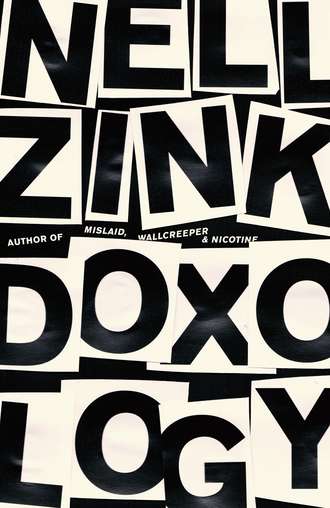
Полная версия
Doxology
“If we have a kid now, we can be out of the woods at forty. I implore you!” He clasped his hands together pleadingly. “Besides, scheduling an abortion is work, but if you just let it ride, you don’t have to do anything. Which I guess is what you’ve been doing. How far along are you?”
“That’s so not true! There’s prenatal care. I have to get sonograms and do Lamaze and La Leche League and turn into my mom. You’re going to love that. Not to mention giving birth and the next eighteen years.”
“It’ll be easy. We’re young and healthy.”
“I should get a pregnancy test,” she said. “Maybe it’s just ovarian cancer.”
THE DISTANCE SHE HAD PUT BETWEEN HERSELF AND HER PARENTS KEPT HER FROM indulging the notion that her child would inherit her traits. It would be its own person, transporting nothing of her into the future. It would be raised differently from the way she had been raised, in a different world. Yet already it seemed to embody personal weaknesses she thought she had learned to repress.
Nausea and latent disquiet, for instance. While still the size of a pushpin, Flora reopened Pam’s eyes to the horror of existence. The Cold War had ended. The peace dividend was pouring in. All the thermonuclear warheads were still there. All, what, ten thousand of them? Twenty thousand? In any case, enough to cook every animal on Earth and leave the survivors licking their eyeballs off their maggoty faces.
Nuclear deterrence was a variant of predestination. Whatever happened to you was your fault, if you hadn’t deterred it. It was life as an endless stud poker game in which folding equaled death. Any day now, life could become The Day of the Triffids, if the Triffids had been defense policy wonks and not evil plants from space. The Triffids in turn reminded her of The Genocides, a novella by Tom Disch in which alien farmers sow the unfortunate Earth with giant sugarcane. Millennia might pass before that happened, but by having a baby, she would be involving herself directly in the tragedy. It was no consolation to recall the survivors’ stubborn capacity for joy or their relief at the conclusion of the harvest. As a willingly pregnant woman, she would at once be placing a long-shot bet that life on Earth would be idyllic forever and condemning a stranger to have its heart broken by her death.
She even worried about the coming Asian century, which she imagined as resembling Karel Čapek’s War with the Newts. Western imperialism was still going strong. It would take fifty years to decline—and there stood the baby, all grown up, undernourished, lopsided from twelve-hour days in the sweatshop, enslaved by happy-go-lucky taskmasters who decorated its dormitory in red and gold. The red tide of slave labor was all around her in Chinatown. She just had to open her eyes to let it engulf her.
She was not getting any work done. She called Video Hit from her office and made Margie wake Daniel so she could say, “There’s no way I’m having this baby. I’m sorry. It’s over.”
“All right. That’s a shame.” After a moment of dead air, he added, “Now I’m sad.”
It crossed her mind that killing Daniel’s baby might not be the most efficient method of removing heartbreak from the world. She said, “In fact, I haven’t made up my mind yet.”
“I wish you were here,” he said. “I’m going crazy. I’ve been thinking about names. What do you think of ‘Irene’? It means ‘peace.’”
“Too nasal for New York. Plus I might not even be pregnant.”
WHEN THEY WERE DONE TALKING, SHE WENT DOWNSTAIRS TO A DRUGSTORE ON JOHN Street. She had put off buying a pregnancy test. After all that time without her period, she wouldn’t have believed a negative result, and a positive result wouldn’t have told her anything she didn’t know, so the parsimonious solution was to skip the test. It was positive.
She didn’t call Daniel. Instead she walked into Yuval’s office, closed the door, and told him that effective immediately she would be disappointing her clients at the insurance companies in Omaha. Flying pregnant was out of the question, due to cosmic gamma rays. When the baby came, she would go on vacation for at least two weeks.
Yuval said, “Mazal tov!” It was not the Ashkenazi one-word MA-zel-tov that means “Congratulations,” but the Sephardic two-word ma-ZAL TOV that means “Good luck with that.”
THAT NIGHT SHE WAITED UNTIL DANIEL WAS JUST ABOUT TO LEAVE FOR WORK TO TELL him. Lying back on his bed, in the shade of the narrow section of wall between his two bright rear windows, she said, “We’re going to have a baby.”
He said, “I feel this is a good time to confess that I love you.”
IN THE MORNING, HE CALLED JOE TO SAY HE COULDN’T AFFORD TO RECORD ANY SONGS, because he would be needing every cent he had to finance his baby. He would lose the $200 deposit on the recording studio, but that was better than paying the balance.
Joe said, “I guess she didn’t tell her parents yet.”
“How do you know?”
“Because you’re worried about money!”
“What do you mean?”
“They’re so rich, they live in a house with a yard and trees!”
As a native of Wisconsin, Daniel didn’t consider a yard and trees proof of affluence. But that night in bed, resting up before work, he did go so far as to ask Pam to explain Joe’s insinuation. He had always assumed she came from a working-class background similar to his own, if only because she hadn’t finished high school. The news about her pregnancy had prompted him to subordinate his artistic ego to the expense of raising a child. Now he wasn’t so sure. Was it conceivable that fatherhood might improve his finances instead of bankrupting him?
She said her dad was a career civil servant with a desk job who planned to retire at sixty. At that point he would commence a second career as a “double dipper,” exploiting his contacts as a defense consultant while drawing half of his former salary. He wasn’t rich, far from it. He made a little under a hundred thousand. In Washington that meant he could have a decent house in a safe part of town, with a wife who didn’t work, living like it was the sixties. He also had—she said this was the problematic part, for her—a clean conscience, though she knew, or could guess, what he’d been involved in during the Vietnam War. She hadn’t talked to him since she left home and had hardly talked to him before that; he was a distant, authoritarian father.
“I know you can do math,” Daniel said. “Do you have any idea what a normal person would have to save to retire on fifty thousand dollars a year for life?”
“They’re not rich. They’re, like, slow-drip rich. They’re middle class.”
“You parents have zero worries!”
“Oh, no. I gave them plenty of wrinkles and gray hair.” It sounded like a boast, so she added, “Or maybe it was napalming old people and kids that gave Dad wrinkles and gray hair. I don’t know and I don’t care.”
“What’s your mom like?”
“I don’t know. The last time I saw her, she was a stingy, controlling bitch.”
“When was that?”
“Nineteen eighty-six.”
“So call her and find out.”
“Call yours first.”
“There’s no danger mine will offer us money. More like secondhand baby clothes from the church basement. Mom will start crocheting a layette set and be done by the time it’s ten months old.”
“Racine’s a safe distance. You can tell them. Though I guess they might want us to be married.”
“I’ll lie. If there’s one thing evangelical Christianity teaches you how to do, it’s lie.”
“You can lie? I can’t say I noticed.”
“It’s not a skill I get much use out of anymore. Christians unearth the innate lying talent of little kids and hone it like a razor. Like when they ask you to raise your hand in youth group if you’ve ever touched yourself, and then raise your hand if you’ve ever touched a girl.”
“So does everybody pick door number two?”
“Hell, no! You’d be getting some girl in trouble. The point is to make you feel guilty and trapped. That’s all. It makes you bond with the other Christians, because you’re all telling the same lies together all the time and everybody knows it. It’s like your platoon did a war crime, so now you’re blood brothers.”
“Did you raise your hand?”
“One time I did raise my hand and say I touched myself, and they acted like I’d come out of the closet. I guess it’s the same thing. My hand touched dick.”
“Can’t have that,” Pam said, touching his dick.
THE INITIAL PLAN WAS FOR HER SOMEHOW TO GET RID OF SIMON, SO THAT SHE AND Daniel and the baby could share the one-and-a-half-bedroom apartment in the doorman building. The size was perfect. They might never have to move again. Daniel’s share would be double his current rent, but that would still leave it in manageable territory.
It was such an elegant solution that Pam presumed Simon would instantly see their side of the question and vanish from her life, if he had any utilitarian model of ethics whatsoever. He refused to budge. He liked his half-bedroom, which allowed him to live in a fancy apartment in an enviable location without paying Manhattan-style rent. Little Jersey wasn’t chichi; it wasn’t Soho or Tribeca; he couldn’t brag that he lived there. It was more of a drinking theme park with shoe stores. But at least it wasn’t a bridge-and-tunnel neighborhood where finding an affordable apartment required reading knowledge of Greek or Polish.
He said he’d be happy to look for a new roommate. With that location, so close to the bars, he could basically run auditions and keep interviewing until he found somebody who’d fuck him. The new roommate was guaranteed, he assured Pam, to be a better fuck than her, because she had never been anything special—too cerebral. He advised her to grow some hair, because it’s sensual for men when women have some hair to grab on to.
He got what he was aiming for. She left in high distress. She couldn’t imagine spending another night under one roof with him. In effect, she evicted herself.
THEY RENTED A U-HAUL TO DO THE MOVE A FEW DAYS LATER. SIMON HELPED CARRY HER dresser and platform bed from the elevator to the truck. He was unwilling to laze around like a pasha in front of Daniel. Daniel in turn noticed Simon’s discomfiture when he packed up Pam’s microwave. “You’re going to miss this,” he prophesied.
“I’ll make sure the new roommate has one,” Simon said.
“Never share an apartment with one person,” she told Daniel as he drove. “Always live in a group situation where the total is an odd number, so you can have majority rule.”
“That’s a discouraging thing to say to somebody you’re about to move in with,” he said. She reminded him that she was two people.
They got married. Of course they got married. The possibility lay there, inducing vertigo, until they did it to get it over with—Daniel for reasons that were primarily romantic, and Pam because marriage made her an ex-Bailey. So they got married, a minor bureaucratic procedure in city hall, downtown, with no special outfits and no party.
Joe waited for them outside the building with a bouquet of wilting rosebuds he had bought at a newsstand and warm champagne that got all over his pants when he opened it. He sang a new song to their happiness, sucked the foam from the bottle, and passed it to Pam. Daniel said, “The bride never drinks at a shotgun wedding,” and drank most of it himself.
IV.
Kill, kill, kill,” Pam breathed. Daniel thought she was referring in her delirium to Faster, Pussycat! Kill! Kill!, but she was attempting a Unix shutdown of the birthing process. Sometimes you have to send the “kill” command a good number of times.
It didn’t work. She kept giving birth.
He didn’t leave the room right away. But he had his limits, and one of them was how much pain he could watch her suffer. He tried to stay and even took part in the conversation about attaching a suction cup to the baby’s head. Then he felt dizzy and left to sit down in the lobby. A nurse came out to tell him it was over.
He called his parents collect. They congratulated him sincerely. But as much as they treasured the birth of a new soul predestined for heaven or hell, they couldn’t see it as a special occasion. It was routine, in the circles in which they moved, to welcome babies. They’d been wondering where his babies were since around the time he turned twenty. Flora was their ninth grandchild. They promised to send a check for fifty dollars. They invited him to come home sometime and bring his wife and daughter.
PAM DIDN’T CALL HER PARENTS. SHE DIDN’T WANT TO HEAR HER MOTHER’S OPINION ON anything—not on Daniel, not on her decision-making skills, not on her choice of hospital.
She’d picked one with a low rate of cesarean sections, and she was regretting it. She’d gotten a touch of fever right toward the end, and her ob-gyn suggested she let them induce labor. She ended up with one giant cramp that went on for seven hours until they hauled the baby out with the VE. It looked as though its birth had involved being thrown from a passing truck, the same figurative truck that had run over her pelvis. Its head was blue from the ears up, crowned with a puffy skin yarmulke for which the technical term was “chignon.”
Looking at the baby filled her soul with the fear of death. Within a week she believed that without Daniel, it would not have lived. Without him, she’d be lying facedown drunk on the bed, headphones blasting Black Sabbath. He kept it warm, dry, and loved and brought it to her to feed.
After two weeks, to her astonishment, she bounced back. The trauma faded. She regained her appetite. She saw that the baby was cuter than she’d remembered. It looked to her less like a scrap of meat torn from her insides and more like a warm, dry, fluffy little human.
She asked Daniel to take a look at her vagina and see whether it too was recognizable as human. She was afraid to use a hand mirror, because it felt like it was in shreds. He said, “Babe, it’s literally identical. Nothing’s changed.”
She looked at it herself and found that he was right. She cherished the hope that she might one day be herself again.
SHE STAYED HOME FROM RIACD TO RECOVER. BABY FLORA KEPT GETTING CUTER AND cuter. Joe came over to inspect her and declared her the cutest baby who ever lived, explicitly praising her purple-and-green head.
She was in fact a cute baby, after the swelling went down. She had Daniel’s tan skin, quite striking with Pam’s blue eyes.
He didn’t get time off from the law firm for having fathered a child. He didn’t even get a cigar or a pat on the back, since he had nothing to gain by telling them about it. Pam had better health insurance, and he felt that he looked to outsiders like an irresponsible character and nothing more: nine months from slum-dwelling loser to slum-dwelling loser dad.
She cared for the baby at the odd times when it wanted to be cared for, slept during the strange hours it saw fit to sleep, sat patiently through the eerie work routine of the rented breast pump, and let him pick up the slack. He was happy when holding Flora and a bottle, happiest when carrying her around the neighborhood hidden in a sling tied to his chest, and seriously indispensable when it came to cleaning, laundry, and shopping.
The medium-term plan was for her to work days while he went on working nights, so that someone was always with Flora. Six weeks after giving birth, she pumped three bottles full of milk and stumbled off to RIACD. Promptly the baby-maintenance scheme collapsed, and not because Daniel wasn’t up to the task. Without napping during the day, Pam couldn’t sleep enough to work. Maybe there are jobs you can do in your sleep, but fixing manual garbage collection in an undocumented big ball of mud isn’t one of them. She went back to work on a Wednesday, and by the following Wednesday it was clear that something had to change. She didn’t want to be the consultant who passes for a profit center because he has so many billable hours, at least until his clients bail.
Thursday morning she called in sick, pumped extra, put in earplugs, and asked Daniel not to wake her until she woke up on her own.
That happened around noon. When the vision came, she opened her eyes and determined that he was next to her in bed, with Flora sprawled naked on his bare chest. She nudged him out of a doze and said, “Daniel. I found a solution.”
“Pray tell.”
“You get a day job, and we hire a babysitter.”
He sat upright, clutching Flora close, and said, “No, no, no.”
“Why not?”
“I am not letting some migrant worker take it out on my daughter how much she misses her kids. We don’t have anyplace to put a Dutch au pair, as much as I’d enjoy hosting one, and we can’t afford a qualified babysitter. We’d have to put her in day care, and there’s no way on God’s earth. Forget it.”
“I meant Joe.”
“Joe,” Daniel said. “Isn’t he, I don’t know, not the most literate—”
“I know she’s your daughter and everything, but she’s also a newborn. She can communicate on his level until she’s at least six.”
“What makes you think he’d do it?”
“He has some okay shifts, but he averages, like, five dollars an hour. We offer him seven, and bingo.”
“No way,” Daniel said. “He trusts everybody. If somebody came up to him on the street and asked if they could hold her, he’d just hand her over.”
“People will think he’s the dad. If I were going to fence a baby, or even liberate it for my own use, would I go after the dad? Anyway, you just invented that crime, because I’ve never heard of it—playground-based baby trafficking. Come on. People around here keep an eye out for each other. You know what they say. It takes a village to raise a child.”
“It takes a parent to raise a child. It takes a village to raise a stray cat. Joe is too trusting to be responsible for anybody.”
“Look who’s talking, the man who wants to hire a stranger! At least he’s a known quantity. And he’ll say yes, because he worships her.”
In the evening they went to see him, bearing Chinese takeout. He didn’t hesitate. Chief among the people he trusted was himself. If someone had offered him a job running the trading desk at Goldman Sachs, he would have taken that too.
He got so excited about his new opportunity that they had to remind him of the existence of the coffee shop. He said he was sure no one there would mind if he missed some shifts, and whenever he was done babysitting, he could pick up where he left off. For all they knew, he was right.
He did have a short attention span, but as Pam said, that might be an advantage. Babies have ways of getting themselves noticed. Joe’s attention span might equip him with unusual patience, by keeping him from noticing that it was the same shriek over and over.
SHE CALLED IN SICK AGAIN ON FRIDAY, AND HE CAME OVER FOR A TRIAL RUN, ARRIVING at nine in the morning. She grabbed a bottle of breast milk from the fridge and warmed it up in the microwave. After she had arranged him feeding Flora, she lay down on the couch for a nap. She didn’t want to disturb Daniel, who was asleep on the bed, having gotten home from work at seven.
Four hours later, she woke up. Joe was holding Flora and a fresh bottle, still sitting at the kitchen table. He said, “I changed her diaper.”
“I’m sorry. I forgot to show you how.”
“No problem. It’s easy, compared to regular underpants. There’s no front and back!”
Nodding affirmatively, she rushed to the bathroom, because she was having this phase where the desire to pee and peeing were sort of the same thing. Through the door, she could hear him singing a blues song to Flora:
Drink another bottle, it’s almost two o’clock
I said drink another bottle, baby, it’s almost two o’clock
You been drinking all this morning and I’ll never let you stop
On the kitchen table, squirming on her back
I said baby’s on the kitchen table, squirming on her back
I’m going to take her little pants off and show her where it’s at
Daniel turned over in bed and said, “Your song is deeply disturbing.”
“The last line needs work,” Joe said. “In blues songs ‘back’ always rhymes with ‘heart attack.’ Maybe ‘wipe her dirty crack.’”
“I think with regard to our professional relationship there should be an ironclad rule,” Daniel said. “No songs about my daughter.”
THEIR ONE CONCESSION TO JOE’S ECCENTRICITIES WAS THE PURCHASE OF A BABY carrier. Pam called strollers “traffic testers,” because of the way caregivers in New York shoved them into the street to stop the cars. They had been transporting Flora in a ten-foot-long carrying cloth that circled the torso multiple times, with an X in back and another X in front, finishing with a knot you had to tie behind your own back. Joe’s attempt to put it on might have worked as a vaudeville routine. For him they invested in a BabyBjörn. They didn’t say it aloud, but they were both ever so slightly concerned that he might forget Flora somewhere if she weren’t firmly attached to his body.
Daniel quit his night job, transitioned to Pam’s health insurance, and signed on with a temp agency in the financial district. The hours would be unpredictable, but the pay was higher than for full-time work—eighteen dollars an hour. Within a week, he had an assignment that would last a year, sitting in for an administrative assistant on maternity leave at an employee benefits consulting firm way downtown, in windy maritime Manhattan, close to Battery Park.
His new colleagues expected almost nothing from him. They seemed thrilled that he knew how to alphabetize. They came to him for help printing spreadsheets.
After work he usually took the handoff, since Pam worked later. In the morning, he headed downtown while she waited for Joe.
The familial stress level declined to near zero. Flora continued to set new benchmarks for infant cuteness. By the time she was six months old, Pam, Daniel, and Joe were in agreement that for her to get any cuter would violate natural law. Her hair had come in wavy and almost black. Her eyes were dark blue. Her face was chubby as a peach.
LIKE DANIEL, JOE TOOK HER ON LONG WALKS STRAPPED TO HIS CHEST. HE HIT ALL THE record stores at least once a week. His former coworkers at the coffee shop fawned like grandparents.
One afternoon he came home and put her on the changing table just as his beeper went off in the pocket of his coat. He left her to go to the coatrack. He was feeling around for the pager’s hard surface in a tangle of candy wrappers when he heard a thump. She was lying on the floor on her side, making a high-pitched groaning noise.
He ran downstairs to call Pam, who had called his beeper. He said, “While I was getting the beeper, Flora fell on the floor! I think she hurt herself!”
“Where are you?”
“Downstairs.”
“Go back up and get her. Hail a cab to the emergency room at New York Downtown right away. I’ll meet you there. Okay?”
“Her arm looked weird.”
“Push her sideways into a box so you don’t have to change her position. Pad it with blankets. I’ll see you at Downtown Hospital. Okay?”
She didn’t call Daniel because she had a bad feeling about what he might say. He confirmed her fears that evening when he arrived home to see Flora’s elbow wrapped in blue bandaging. It was sprained. Joe had thought it was broken because he didn’t really do shapes. Daniel said they couldn’t go on letting a retard care for their child. He stopped himself and added, “He’s not retarded. Of course not. I just mean—”
“What did he do differently from anybody else?” Pam demanded to know. “Do you really think there’s any babysitter in the world that wouldn’t have happened to? She rolled over. There’s a first time for everything. And he was flawless. He charmed his way into pediatric orthopedic surgery before I could even get down there. She was fixed before I even caught up with them. She’s fine!”
“She has a monster bandage,” Daniel said. “What if she’d been bleeding?”
“What do we have to do, hire a registered nurse? I know Joe couldn’t splint a broken arm to save his life, and the box he put her in was way too big. But he knew something was wrong, and he got her to the hospital. That’s one of the reasons to live in Manhattan. It’s never far to the best medical care in the world.”






